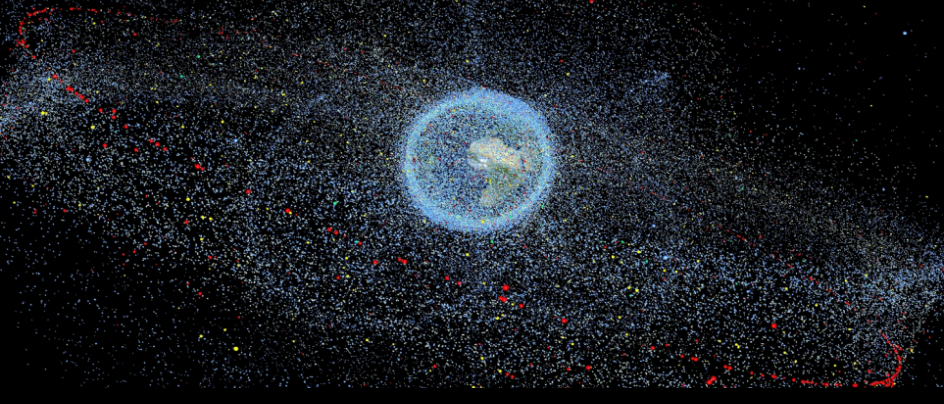-
People
The workshop is being organised by ESA's Space Debris Office (SDO), with Xanthi Oikonomidou and Vitali Braun as the workshop chairpersons. We are receiving significant support in the organisation, especially for the moderated working sessions, by Michael Clormann from the Munich Center for Technology in Society (MCTS/TU München).
Thank you to everyone involved in the organisation and all the participants for providing their ideas,for all the discussions and feedback we received already!
-
Workshop Idea
An essential part of our common understanding of the space debris environment emanates from our capability to shape the knowledge - obtained from measurements in general and known space activities and their contribution to the space debris problem - into a model which lends itself to the assessment of risk to space and ground assets today, but also its potential future evolution.
The Meteoroid and Space Debris Terrestrial Environment Reference (MASTER) model has been developed over the past few decades by the European Space Agency (ESA) through various research and development activities. Providing flux estimates for any Earth-bound target orbit down to object sizes of 1 μm, the European reference model MASTER has gained international acceptance and is applied in risk assessments during mission design; the planning of measurement campaigns and sensor performance assessments; the evaluation of mitigation measures and their effectiveness; etc.
ESA has always played a major role in leading many of the research activities related to space debris, at the same time recognising the significant contributions by other institutions and the coordination efforts primarily by the Inter-Agency Space Debris Coordination Committee (IADC). With space activities mostly conducted by public entities for many decades, ESA and other agencies developing space debris models were most of the time assuming the role of the customer and the user simultaneously. Over the past two decades the roles have shifted significantly, especially in view of the on-going commercialisation of space, and many new entities to get involved in space activities. Continuing the maintenance and the development of the MASTER model, the Space Debris Office has recognised that it remained the customer while the user roles have been distributed all over the globe.
In this workshop, we would like to initiate the discussion on how collaborative approaches can be established within the community to facilitate exchange related to the MASTER model on the data and measurement collection (including ground-based measurements, in-situ detectors, returned surfaces, but also other approaches like assessing star tracker or telemetry data for potential space debris signatures), its interpretation and application in the modelling context, the use-cases of the model and its relevance in mission design, the latter usually relying on an accepted future scenario of the space debris environment. Everyone directly or indirectly affected by the modelling efforts and involved in activities ranging from the studying of the space debris environment, over mission design to policy decisions, is invited to participate!
We believe that addressing the modelling part through a participative process is more likely to be accepted as a reference solution by the community. At the same time, when stakeholders with various knowledge, skills and resources are facilitated to give creative and critical input which is then translated into action, a culture of shared responsibility and ownership is being established, further reinforcing the consent on the model applied by the community.
-
Day 1 - Measurements & Model Validation
D1-MMVThe first workshop day is all about obtaining measurements, how to define model needs in that respect and how they can find their way into the model.
Event Link (14:00 - 18:30 CET)
Event Address: https://esait.webex.com/esait/onstage/g.php?MTID=e1cc888ab1d66cd8d6ceb336dfcb97aa2
Event Number: 181 486 2309
Event Password: SHfRcvTZ226Quiz Night & Virtual Gathering Link (20:00 - 21:30 CET)
Meeting Address: https://esait.webex.com/esait/j.php?MTID=m7b31222fecc7dd90e8cbf474614ea386
Meeting number: 181 709 7965
Meeting password: h9VjBDmu3j6 -
Day 2 - Working with MASTER
D2-WWMThe second workshop day is about applying the MASTER model in mission design, risk analyses and other domains. This also includes the exchange on MASTER's standardised interfaces, such as STENVI.
Event Link (14:00 - 18:30 CET)
Event Address: https://esait.webex.com/esait/onstage/g.php?MTID=e19650c0094c4352ba74f3076cc9ec167
Event Number: 181 785 2230
Event Password: VtStmHxM633 -
Day 3 - A Future Scenario
D3-AFSFor the last workshop day, we want to discuss how one could use the MASTER model to create a future scenario the community would be ready to accept and use in projects that rely on future flux estimates.
Event Link (14:00 - 18:30 CET)
Event Address: https://esait.webex.com/esait/onstage/g.php?MTID=ee2afde130d6e0d1bba38f97b2b3151e8
Event Number: 181 747 5933
Event Password: CEhx2J9psC2
Choose timezone
Your profile timezone:

